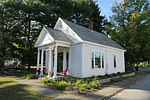Quinebaug Woods

Quinebaug Woods is a 36-acre (15 ha) open space preserve located in Holland, Massachusetts. The property, acquired in 2001 by the land conservation non-profit organization The Trustees of Reservations, is named for the Quinebaug River, which runs through the reservation.The reservation is located off Dug Hill Road in northeast Holland and offers 1.1 miles (1.8 km) of hiking trails, woodlands, river frontage, a scenic vista, and the remains of a 1930s cabin atop the hogback Blake Hill. The reservation is open to hiking, picnicking, horseback riding, fishing, and cross country skiing. Quinebaug Woods is part of a contiguous area of protected open space including the United States Army Corps of Engineers' East Brimfield Dam/Holland Pond Flood Control and Recreation Area.
Excerpt from the Wikipedia article Quinebaug Woods (License: CC BY-SA 3.0, Authors, Images).Quinebaug Woods
Dug Hill Road,
Geographical coordinates (GPS) Address Nearby Places Show on map
Geographical coordinates (GPS)
| Latitude | Longitude |
|---|---|
| N 42.069621 ° | E -72.156033 ° |
Address
Dug Hill Road 9
01521
Massachusetts, United States
Open on Google Maps









